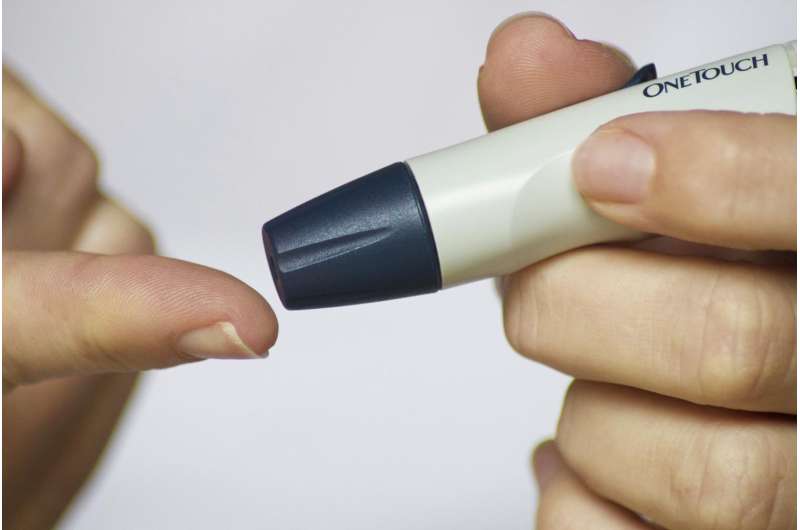Study shows that plasma protein supplementation helps prevent cell death in diabetes

Diabetes continues to be a global health problem, with the number of cases projected to rise from 285 million in 2010 to nearly 400 million by the year 2030. Diabetes is the fourth leading cause of death worldwide.
Though medications have been developed to manage diabetes there is no therapy that can cure the disease. Long-term, the disease can cause complications affecting the eyes, heart, kidneys, and nerves.
Isaac Cann, a professor of animal sciences and microbiology at the University of Illinois, and his collaborators at Mie University School of Medicine (Japan), have found that a protein made by the human body may be key in preventing cell death in diabetes.
Diabetes has two major forms: type 1, in which the body does not produce insulin, and type 2, in which the body has too little insulin or is not able to use the insulin properly. The cause of reduced insulin in the body that is common to both types of diabetes is the death of important pancreatic beta-cells: the cells that produce and regulate insulin in the body.
A research collaboration between the U of I and Mie University Faculty and Graduate School of Medicine in Japan, shows evidence that supplementation of protein S, a plasma protein that is reduced in people with diabetes, can help minimize the effects of the disease by suppressing cell death of the beta-cells.
"A significant problem of diabetes is the death of the beta-cells which of course, produce insulin.
Type 1 diabetes is mostly genetic, whereas type 2 is basically lifestyle-related, but the progression of diabetes is the same," Cann explains. "We know that in each case there is apoptosis (death) of these cells that produce insulin. So this study is really looking at how to prevent this cell death. Irrespective of the type of diabetes, if protein S is actually able to prevent death of the cells that produce insulin, then of course it is going to help in both cases.
"And so by finding that this protein, which is actually made by humans, suppresses the death of these cells is really a major finding. Maybe supplementation of this particular protein can help alleviate the progression of the disease."
Protein S is an anticoagulant factor that regulates inflammation, as well as cell destruction or cell death. Little has been known about the effect of protein S on diabetes and its related complications.
Cann and collaborators set up a study to compare the development of diabetes in mice that were overexpressing human protein S (transgenic), or were administered protein S after developing diabetes.
The researchers saw significant inhibition of beta-cell death through observed improvements in blood glucose levels, glucose tolerance, insulin sensitivity, and less severe kidney damage in the protein S mice and the mice that had been treated with protein S.
Because the level of circulating protein S is reduced in people with diabetes, the researchers were encouraged to see that supplementing protein S did have an impact.
"Our bodies are very complex. Unless there is another protein that degrades that protein S—which in that case, this sort of treatment is not going to work— we thought that perhaps boosting or administering protein S could work. We did not see degradation of protein S, at least in a mouse. If you administer it directly or increase the level, you see the good effect. So perhaps if you give it to humans, it will not be degraded and it will prevent the death of cells that make insulin," Cann explains.
Esteban Gabazza, an immunologist and professor from Mie University, explains that death of cells that are essential for the function of organs is the cause of several diseases, one of which is diabetes. "Death of structural cells from the kidneys also causes kidney disease in people with diabetes. Therefore, based on this experimental discovery, it is possible that supplementation of protein S may prevent not only diabetes progression but also its related kidney complications.
"Because the prognosis of diabetic subjects is far worse than the healthy general population, clinical application of this new discovery will definitely change the life expectancy of many people suffering from this disease," Gabazza says.
Though Cann says it could take some time before a treatment could be available, he adds that the study gives enough evidence to suggest that researchers should keep moving forward with protein S.
Ultimately, Cann says it is about finding a treatment that can be offered earlier to lessen the complications of diabetes.
"Basically, when you have diabetes, your body is malfunctioning. The balance in your entire physiology is thrown out of whack. If we are able to arrest the problem from earlier stages of the progression, we can prevent the downstream effects," he says.
Cann will continue collaborating with Gabazza (corresponding author) and colleagues at Mie University to further understand diabetes.
"We think this is just a first step for these collaborations. We will also be bringing in our knowledge of the microbiome to work on diabetes, and maybe find some new solutions," Cann says. "Many labs are working on this, but this is a very important contribution. Hopefully this is a concept that others will go out and test."
More information: Taro Yasuma et al, Amelioration of Diabetes Mellitus by Protein S, Diabetes (2016). DOI: 10.2337/db15-1404



















